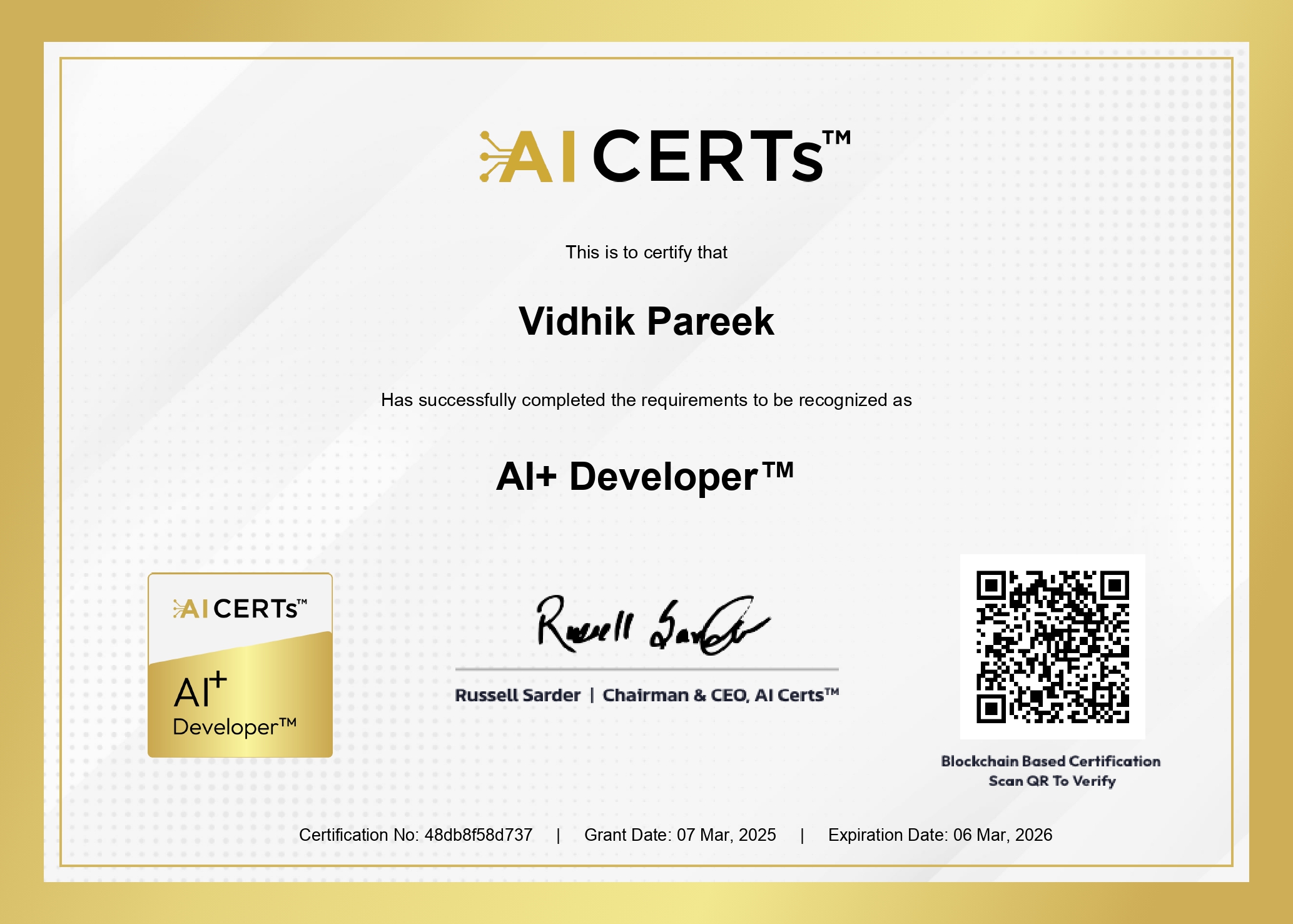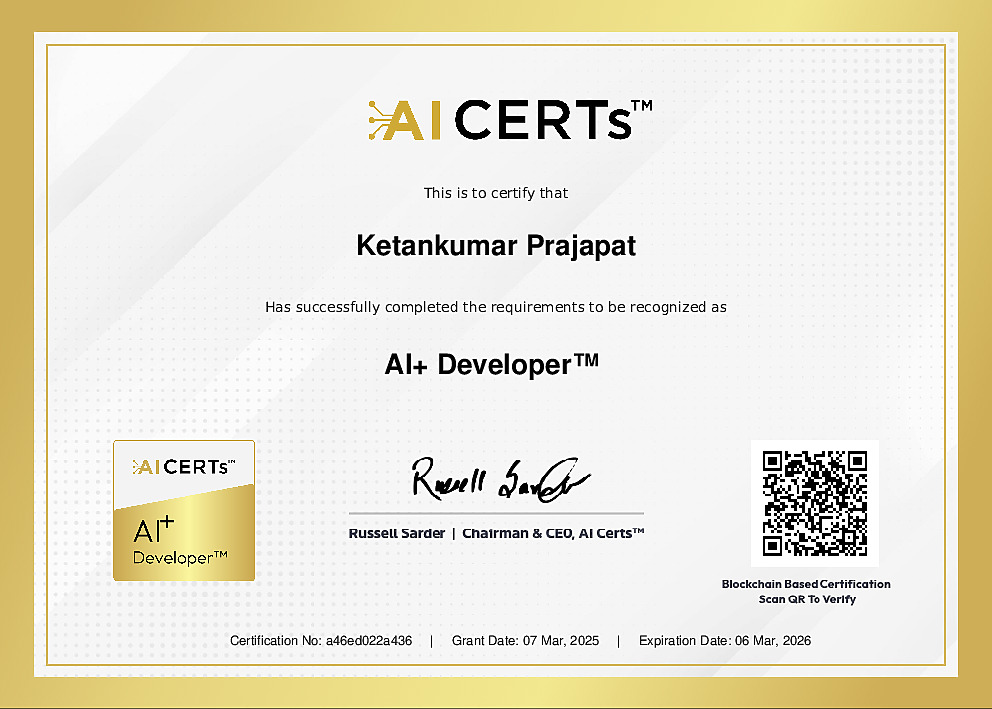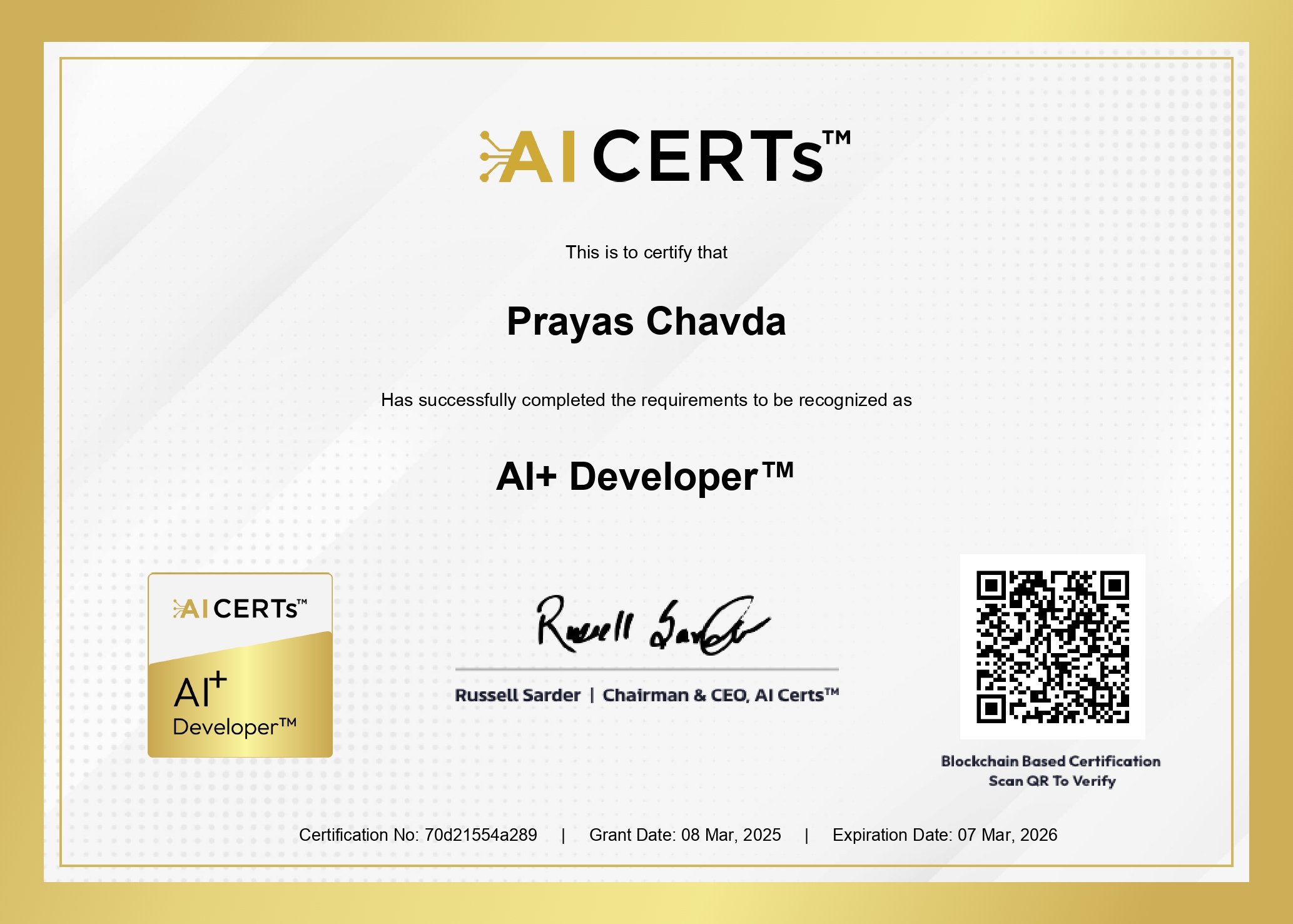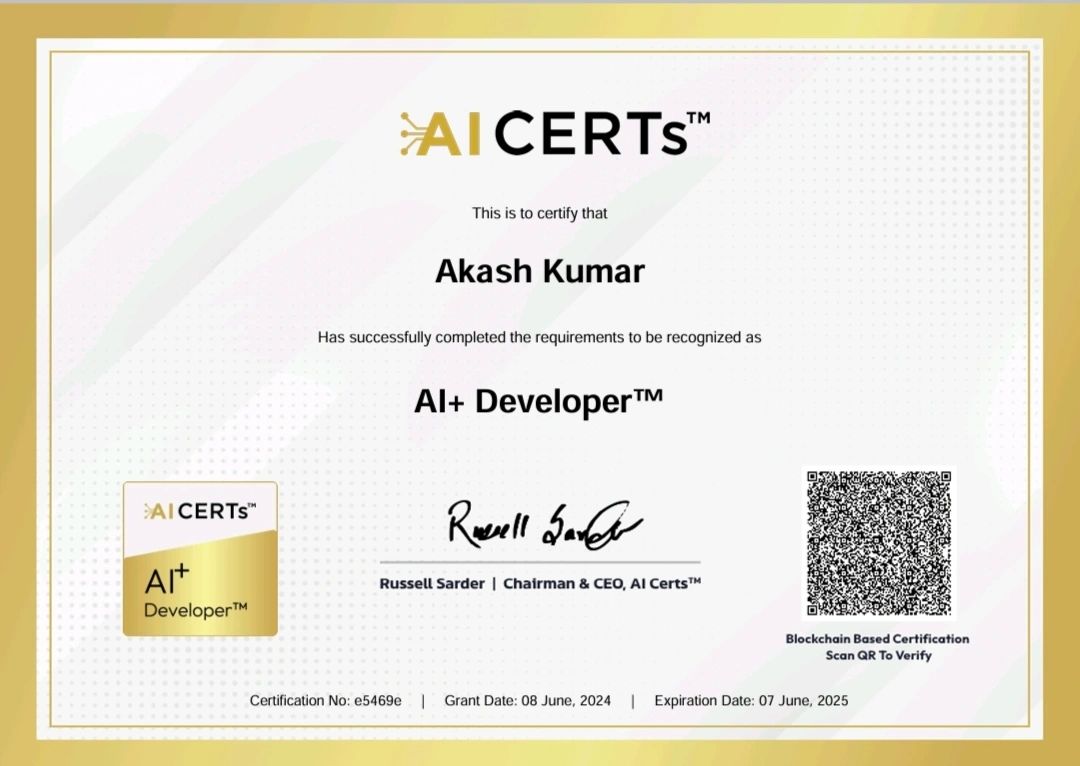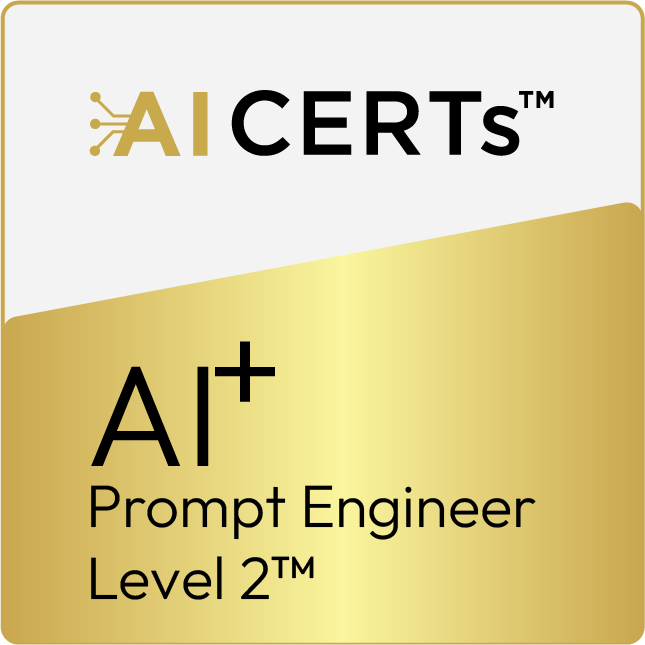AI+ Developer™
AT-310
Get hands-on with the tools and technologies that power the AI ecosystem.- Core AI Foundations: Covers Python, deep learning, data processing, and algorithm design
- Hands-on Projects: Focus on NLP, computer vision, and reinforcement learning
- Advanced Modules: Includes time series, model explainability, and cloud deployment
- Industry-Ready Skills: Prepares learners to design and deploy complex AI systems
Why This Certification Matters
At a Glance: Course + Exam Overview
- Instructor-Led: 5 days (live or virtual)
- Self-Paced: 30 hours of content

Who Should Enroll?
Software Developers: Enhance your coding expertise by mastering AI algorithms and deep learning techniques.
Data Enthusiasts: Apply AI-driven data analysis, machine learning models, and deep learning to solve complex problems.
Computer Vision & NLP Researchers: Dive into specialized AI fields, including computer vision and natural language processing.
IT Specialists & System Architects: Integrate AI solutions into existing systems and optimize performance.
Students & Fresh Graduates: Build a strong foundation in AI development and prepare for future opportunities in tech.
Industry Growth: Equipping Developers to Create Intelligent, Scalable Solutions
- he 2024 Stack Overflow Developer Survey indicates that approximately 82% developers are currently using AI tools to write code.” (Statista)
- Designing AI-driven applications to improve system performance and solve real-world problems using advanced programming techniques.
- Leveraging deep learning and optimization techniques to enhance model accuracy and efficiency, leading to smarter AI solutions.
- Specializing in NLP, computer vision, and reinforcement learning to build sophisticated AI models tailored to various industry needs.
- As AI-driven development roles expand rapidly, there is a growing demand for developers with AI expertise, leading to high-paying job opportunities globally.

Skills You’ll Gain
- Python for AI Development
- Advanced Mathematics and Statistics
- Optimization Techniques
- Deep Learning Fundamentals
- Data Processing and Exploratory Analysis
- NLP, Computer Vision, or Reinforcement Learning Specialization
- Time Series Analysis
- Model Explainability and Deployment
What You'll Learn
- Course Introduction
- 1.1 Introduction to AI
- 1.2 Types of Artificial Intelligence
- 1.3 Branches of Artificial Intelligence
- 1.4 Applications and Business Use Cases
- 2.1 Linear Algebra
- 2.2 Calculus
- 2.3 Probability and Statistics
- 2.4 Discrete Mathematics
- 3.1 Python Fundamentals
- 3.2 Python Libraries
- 4.1 Introduction to Machine Learning
- 4.2 Supervised Machine Learning Algorithms
- 4.3 Unsupervised Machine Learning Algorithms
- 4.4 Model Evaluation and Selection
- 5.1 Neural Networks
- 5.2 Improving Model Performance
- 5.3 Hands-on: Evaluating and Optimizing AI Models
- 6.1 Image Processing Basics
- 6.2 Object Detection
- 6.3 Image Segmentation
- 6.4 Generative Adversarial Networks (GANs)
- 7.1 Text Preprocessing and Representation
- 7.2 Text Classification
- 7.3 Named Entity Recognition (NER)
- 7.4 Question Answering (QA)
- 8.1 Introduction to Reinforcement Learning
- 8.2 Q-Learning and Deep Q-Networks (DQNs)
- 8.3 Policy Gradient Methods
- 9.1 Cloud Computing for AI
- 9.2 Cloud-Based Machine Learning Services
- 10.1 Understanding LLMs
- 10.2 Text Generation and Translation
- 10.3 Question Answering and Knowledge Extraction
- 11.1 Neuro-Symbolic AI
- 11.2 Explainable AI (XAI)
- 11.3 Federated Learning
- 11.4 Meta-Learning and Few-Shot Learning
- 12.1 Communicating AI Projects
- 12.2 Documenting AI Systems
- 12.3 Ethical Considerations
- 1. Understanding AI Agents
- 2. Case Studies
- 3. Hands-On Practice with AI Agents
Tools You’ll Master

GitHub Copilot

Lobe

H2O.ai

Snorkel
Prerequisites
- Basic math, including familiarity with high school-level algebra and basic statistics, is desirable.
- Understanding basic programming concepts such as variables, functions, loops, and data structures like lists and dictionaries is essential.
- A fundamental knowledge of programming skills is required.
Exam Details
Duration
90 minutes
Passing Score
70% (35/50)
Format
50 multiple-choice/multiple-response questions
Delivery Method
Online via AI proctored exam platform (flexible scheduling)
Exam Blueprint:
- Foundations of Artificial Intelligence (AI) - 5%
- Mathematical Concepts for AI - 5%
- Python for AI Development - 10%
- Mastering Machine Learning - 15%
- Deep Learning - 10%
- Computer Vision - 10%
- Natural Language Processing (NLP) - 15%
- Reinforcement Learning - 5%
- Cloud Computing in AI Development - 10%
- Large Language Models (LLMs) - 5%
- Cutting-Edge AI Research - 5%
- AI Communication and Documentation - 5%
Choose the Format That Fits Your Schedule
What’s Included (One-Year Subscription + All Updates):
- High-Quality Videos, E-book (PDF & Audio), and Podcasts
- AI Mentor for Personalized Guidance
- Quizzes, Assessments, and Course Resources
- Online Proctored Exam with One Free Retake
- Comprehensive Exam Study Guide
- Hands-on Labs
Instructor-Led (Live Virtual/Classroom)
- 5 days of intensive training with live demos
- Real-time Q&A, peer collaboration, and hands-on labs
- Led by AI Certified Trainers and delivered through Authorized Training Partners
Self-Paced Online
- ~30 hours of on-demand video lessons, e-book, podcasts, and interactive labs
- Learn anywhere, anytime, with modular quizzes to track progress
Discover Your Ideal Role-Based Certifications and Programs!
Not sure which certifications to go for? Take our quick assessment to discover the perfect role-based certifications and programs tailored just for you.
Get CertifiedFrequently Asked Questions
Upon completion, you will receive an AI+ Developer™ certification, showcasing your proficiency in AI. You'll have the skills to tackle real-world AI challenges and implement advanced AI solutions in various domains.
While prior AI knowledge is not mandatory, a fundamental understanding of Python programming and basic math and statistics will help you grasp the advanced concepts covered in this course.
Yes, the course includes various hands-on projects and practical exercises to help you apply theoretical concepts to real-world scenarios, reinforcing your learning through practical experience.
You cannot choose a specialization in this course. However, you will be trained in areas such as Natural Language Processing (NLP), computer vision, and reinforcement learning.
Your progress will be evaluated through a combination of quizzes, hands-on exercises, and a final assessment. These evaluations are designed to test your understanding and application of the material.

